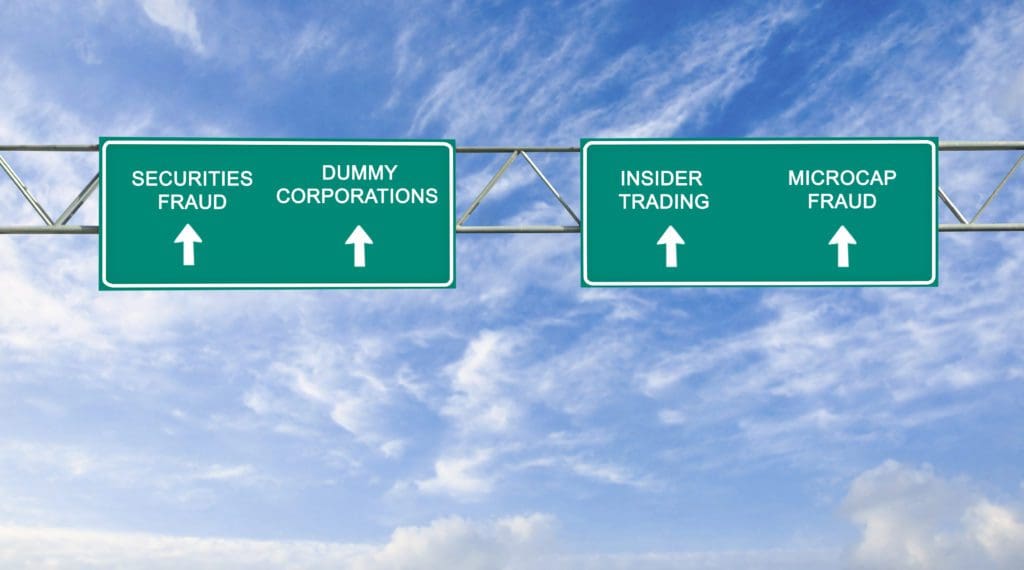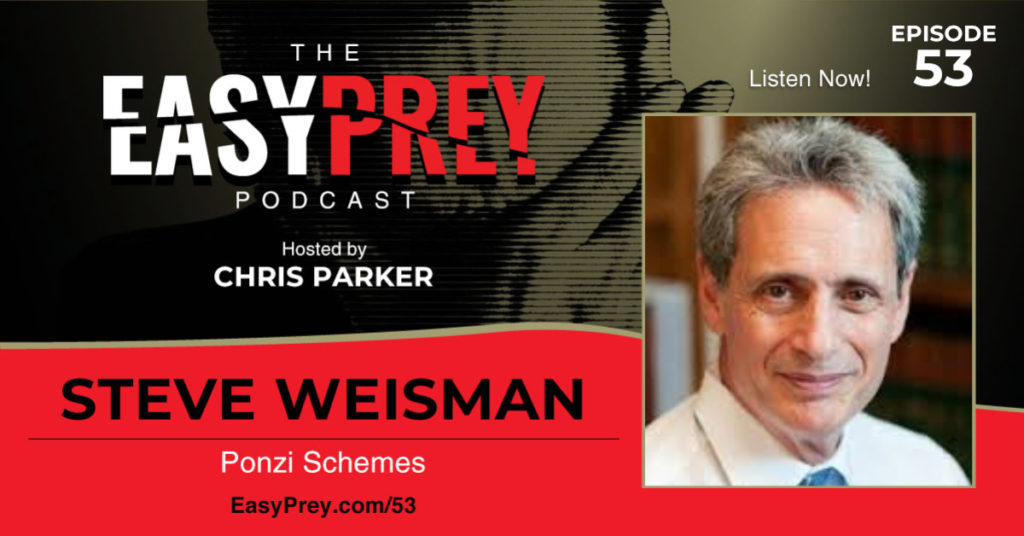
Some believe Ponzi schemes are doomed to fail. But with a sophisticated schemer and a broad enough base of people, they might just be able to keep it going. In honor of Charles Ponzi’s birthday, we talk about the history of the Ponzi scheme and some of the amazing stories of how they’ve been exposed and ways to see them coming.
Today’s guest is Steve Weisman. Steve is a nationally recognized expert in scams and identity theft as well as a lawyer, college professor, and prolific author. His informative speeches, articles, and books make difficult subjects not only understandable, but enjoyable with the humor he brings to these complex issues. Steve is passionate about educating people through his website Scamicide.com.
“A significant number of Ponzi schemers don’t start out that way. They just fall into it and they’re too afraid to own up to what happened.” Share on XShow Notes:

- [1:16] – Steve has a personal backstory with a Ponzi scam because his father became the victim of one several years ago. His father was an astute businessman and the people involved with it seemed very honest.
- [1:50] – Steve also became a victim of identity theft himself and then wanted to help others not have the same problem.
- [2:29] – After WWI, Charles Ponzi came up with a plan to make money. Steve admits that it is very hard to explain and that is the key to a Ponzi scheme.
- [3:45] – Schemers blamed their victims for falling for the scheme. They claimed that they deserved what happened because they weren’t smart enough.
- [4:58] – Steve describes how Charles Ponzi used the money from investors and shares why a more recent scheme in 2008 was successful.
- [5:46] – In the case of Charles Ponzi, law enforcement didn’t bring him down. The media did.
- [6:29] – Ponzi did spend time in prison and was kicked out of the country. He went back to Italy and actually scammed Mussolini.
- [8:04] – Ponzi was probably not the first person to scam this way. In Steve’s research, there was an earlier scam by a woman named Sarah Howe in the 1870s.
- [9:42] – Upon being released from prison, Sarah went back to her old ways and developed the same exact scam.
- [10:16] – Steve shares the story of Brad Bleidt to illustrate the term “affinity fraud.” Brad was a Mason and other Masonic groups trusted him.
- [11:01] – Sarah Howe targeted women. Brad Bleidt targeted other Masons. Bernie Madoff targeted mostly other Jewish people. We trust those who are like us.
- [12:21] – Steve shares a story about how Bernie Madoff was actually found out much earlier and reported multiple times.
- [14:10] – This is not just an American phenomenon. A massive Ponzi scheme in Romania took down most of the nation’s economy.
- [14:43] – When you deal with any kind of investment, you want to check out two things. The first thing is the person you’re dealing with. The second thing is to fully understand what you’re investing in.
- [15:28] – People like Madoff and Bleidt would be an investment advisor and the person who holds the investment. Most of the time, you want your investment advisor and custodian as separate people.
- [17:13] – Chris asks a new question of the guest and Steve says it is a very important question. Do these schemes start out as frauds to begin with or do they evolve into it?
- [19:10] – Some schemers don’t start out that way. They need a little bit more money or time and before they know it, they’re in too deep.
- [20:03] – Steve points out that Bernie Madoff may have been able to get away with his scheme forever if it weren’t for the unprecedented economic issues in 2008.
- [21:42] – Bernie Madoff was never actually caught. He knew he was about to be caught and turned himself in. Steve shares the interesting facts of the case and where the money wound up.
- [24:29] – Ultimately, the money invested with Madoff was able to be returned to investors. But this is unusual. Most of the time, the money is dissipated.
- [25:08] – Ponzi schemers will appear very successful and wealthy when in reality they are dissipating the funds that they get to appear that way.
- [27:35] – In addition to living lavish lifestyles, some schemers may have issues with gambling.
- [28:23] – Steve shares the story of a Ponzi schemer in Florida who was a lawyer. He was a fixture of the high life in South Florida.
- [30:24] – There was a Texas scammer that owned a bank in the Caribbean selling CDs at high rates. Rather than Ponzi, this was similar to Madoff’s approach.
- [32:01] – Chris and Steve discuss the regulatory organizations that are intended to investigate Ponzi schemes.
- [34:18] – If you feel like you are a victim of a Ponzi scheme, you need to report it to the SEC or the Federal Trade Commision.
- [35:10] – Investing all of your money into one thing is not a good idea, either. The markets go up and down. Diversification as much as possible is helpful.
- [36:01] – Steve references the recent GameStop stock that appeared to be a “pump and dump” scam but was not.
- [38:40] – You have to do your homework on investments. No one likes to do the research and the homework, but it can be detrimental if you do not.
- [39:53] – In reference to the GameStop stock, Steve explains that when investors were “sticking it to the man,” they were impacting hedge funds.
- [41:05] – Steve is a big believer in investing but clarifies that day trading is not investing, but rather gambling.
- [43:03] – Chris and Steve sum up the red flags to look for to avoid being a victim of a Ponzi scheme.
Thanks for joining us on Easy Prey. Be sure to subscribe to our podcast on iTunes and leave a nice review.
Links and Resources:
- Podcast Web Page
- Facebook Page
- whatismyipaddress.com
- Easy Prey on Instagram
- Easy Prey on Twitter
- Easy Prey on LinkedIn
- Easy Prey on YouTube
- Easy Prey on Pinterest
- Scamicide Home Page
- Books by Steve Weisman
- Scamicide on Facebook
Transcript:
Chris: I know that you are passionate about helping people not becoming victims of scams. We didn't talk about it last time but what was that watershed moment where you said, I want to do something about this?

If it sounds too good to be true, it probably is!
Steve: There were really two of them. One goes back to my youth when my father was a victim of a Ponzi scheme. I had no idea what that was like. He lost some significant money. My father was a pretty stupid businessman. I was astonished by the people with whom he was dealing. They seemed like the most honest, regular people. It wasn't something shady. It wasn't even something particularly greedy. That intrigued me.
The second was even closer to home. I became a victim of identity theft. I started to look into not just how it affected me but how that works, how serious it is, how pervasive it is. It's a family connection. They're all so great stories.
Chris: Yes. There are some amazing stories. That's what we're going to talk about today. This episode will record to get before March third. March third is Charles Ponzi's birthday and he's often referred to as the one who Ponzi schemes are named after. How did all that come into play? What's his story?
Steve: His story is pretty good. Just after World War I, Ponzi was working in Boston. He came up with a scheme where he was taking advantage of and leveraging currency rates for these steps that we use in international transactions between the United States and Italy in particular.
It's a little bit hard for me to explain, and that's the key to it because what happens with so many Ponzi schemes is they sound a lot legitimate but in fact, they're not.
There's a Yiddish term called chutzpah or gall. Bernie Madoff really was the ultimate Ponzi schemer and the ultimate chutzpah gall. Chris, one of the definitions for chutzpah was the boy who murders his mother, murders his father, and then asks for mercy from the court because he's an orphan.
Madoff, in an interview—I actually heard him say this—he blamed his victims. He said it was their own fault and if they had actually looked into what he said he was doing, they would have seen it was impossible.
That's a theme that we see a lot. You have something that appears to be legitimate. It may be a little bit more complicated than the average person can understand. However, people are making money, it's been going on for a while so it must be legitimate. He looks legitimate.
That's what Ponzi was doing. He took this very simple scheme. He said I'm smarter than everybody else, I'm going to leverage the differences and the currency rates, and he promised 90% returns in 45 days. Really good.
That actually contrasts with Bernie Madoff. Madoff, out of all the Ponzi schemers that I've studied, promised the least. What was interesting was he never lost, never had a losing month. He had continual upswings and was always profitable.
But Ponzi was in the typical Ponzi scheme. He takes in money. He doesn't invest it, but he pays off the older investors with the money from the newer investors. This is how the thing goes on and on. Very often, it seems like they should inevitably fail.
In fact, what happened with Madoff was it wasn't a problem with his scheme that caused him to get caught. It was that—this was in 2008—people needed their money and so they started asking for it back and he didn't have that. I've seen that before. There's some kind of precipitating event where people need their money back. With Ponzi, what was interesting—and there have been other instances of these as well—law enforcement didn't bring him down. The media did. You did. Reporters did.
There was a Boston newspaper. Ponzi obviously was not cooperating with this investigative story, but they were able to figure out how many clients he had. They realized that with the number of clients he had, he had to have more of these international scams than existed in the world.
It was definitely a scam and it was always—which brings me to a chuckle when he was arrested—I'm innocent, I look forward to my day in court where I can explain all of this. I'm surprised he didn't run because he did go to court. He was convicted. He did his time. He was kicked out of the country and sent back to Italy.
I used to work with a talk show host in Boston. He said someone would have testicular fortitude. He had particular testicular fortitude because he scammed Benito Mussolini. Not a good thing to do. However, he was a little bit smarter than he was in Boston and this time, he got out of the country before he got killed.
The thing with Ponzi's scheme is, it's marvelous in its simplicity. That's the thing. It has been repeated time and time again. It preys on the greed of people. It preys on our often laziness of not willing to do the homework. It preys on trusting people in whom we should not have trust. Time and time again, Ponzi schemes have been successful. They are successful now. They are out there. I'm sure there are many that we're not even aware of yet but we will become aware.
Chris: I'm sure. Let's go back to Ponzi. Was he the first Ponzi scheme or is this a scam that's been around for thousands of years? Were they doing it with salt back in the 400 AD?
Steve: They probably were. I'm really glad you asked that, Chris, because, in my white-collar crime class that I teach at Bentley University, I talk about sexism here. In my research, the real founder of the modern Ponzi scheme was also in Boston—something about my town, I guess—in 1870. It was a woman named Sarah Howe.
What was fascinating about her was she found a special niche. It's the 1870s. Women are hardly even allowed to own property. They're not considered to be sophisticated financially. Sarah Howe opened what she called the Women's Only Bank. Only women could deposit there. She again was promising an outrageous rate of return. It was less than quite Ponzi-ish but she's going about 8% a month. Fantastic. However, she would tell her depositors that they couldn't withdraw their money whenever they wanted because she was going to act as their fiduciary, help them, and be responsible for them.
Of course, there were no investments. She wasn't doing anything with the money except spending it. Once again, it was the media that was able to—in that case, the newspapers—do an investigation. They found out that there was no money, no bank accounts, nothing there. In turn, she went to prison. She became rehabilitated, well maybe not. Immediately upon coming out, she did the exact same scheme. She opened up another bank. She managed to persuade women to invest in her which is another key that we see in a lot of scams and particularly, Ponzi scams, what we call affinity fraud. We trust people who are like us. Who is like us? That depends on what that identity is going to be.
For instance, there was a modern-day Ponzi schemer again in Boston, a guy named Brad Bleidt. He had an investment company. He was also a member of the Masons. He represented a large number of not just individual Masons, but Mason chapters. When he got caught, suddenly, all the things toppled. People lost their money.
I remember talking to some of these victims and the biggest thing was how can a Mason take advantage of us? It was the same thing with Sarah Howe. Women trusted another woman. With Bernie Madoff, he was an equal opportunity scammer. He took in a lot of people, but he very much focused on Jewish people because he was Jewish. Again, a Jew would not cheat on another Jew. Well, guess what? Bernie Madoff certainly did.
The patterns keep on repeating themselves. It's interesting. It’s like a precipitating event. With Brad Bleidt in Boston, he was taking in new money. Then, one of his major investors which was a church—kind of ironic—had to return a huge donation they had, a multi-million dollar donation to a scammer who had gotten in trouble with the IRS. He needed to pay off the IRS, so the church agreed to give him back his money but there was no money because the scammer had already taken it.
Chris: Oh, geez. One scammer wanted money back from a different scammer.
Steve: Exactly.
Chris: I see these things ebb and flow over time. Are there other schemes that basically operate the same as a Ponzi scheme but go by other names?
Steve: They pretty much will use it. The Ponzi scheme will be used for a wide variety, but the essence is that people are investing. They think they have a legitimate investment and sometimes, it isn't as totally clean as with Bernie Madoff. Bernie Madoff, one of the interesting things in here is with shame on the SEC.
There was another investment guru, a guy named Markopolos, who was asked by the company he was with to look into what Bernie Madoff is doing—try and figure out what he's doing and we're going to do the same thing. He said it only took him a few minutes to realize what Bernie Madoff said he was doing was impossible. But then he had to find out how it worked when he looked into the amount of money that was coming in and what the investments would have to be. The key thing for Markopolos was, he said, I went to every brokerage house in the country and said, do any of you handle any trades for Bernie Madoff? The answer was no. Not a single company did trades for Madoff. Money was coming in and no money was being invested.
Markopolos reported this to the SEC about three times. Each time, they did whatever investigation, never came up with anything. Here's a problem with Bernie Madoff, part of it was he had a stellar reputation. He had been the President of NASDAQ at one point in time.
The SEC has not done generally a good job at finding this out. But not to just pick on the SEC, law enforcement hasn't either. Quite often, what you find is the Ponzi scheme only becomes uncovered when there's a major problem, or frankly, the media looking into some wizard guru. But this has even happened in countries. Romania suffered a major Ponzi scheme that took down much of the country's economy. It works. It's simple which is always helpful. It's easy to cover up.

Research the people you go into business with. Check their history.
One of the key things for most of your listeners is when you deal with any kind of investment, you want to check out two things. The first thing you want to check out the person you're dealing with. You want to investigate them. In many of these Ponzi scams, these are people who have been criminals and don't have the proper credentials. With Bernie Madoff, that wouldn't have worked. He did look good on paper. Then, you want to understand the investment in which you're investing. That's something important as well. If you don't understand it, you shouldn't be investing in it.
Warren Buffett, for a long time, didn't invest in tech. How can you not invest in tech? He wasn't comfortable. He didn't understand it. But here's the key thing that you find that a lot of people don't recognize when it comes to dealing with Ponzi schemers as an investment. People like Madoff, people like Brad Bleidt, what they would do is they would be your investment advisor and they would also be the custodian, the person who is holding the investment.
Most of the time, what you want to do is you want to have your investment advisor but you want a separate custodian, a separate broker-dealer—someone who is also going to be checking in on this. In the case of Madoff, in the case of Brad Bleidt, by being both, all they had to do was falsify the records. They're only lying to themselves and the victims were fooled.
Chris: By having the two entities involved, it allows for a few checks and balances.
Steve: Exactly. We have seen instances where there have been initially people who may have been Ponzi schemers who might have been brokers for Merrill Lynch and legitimate companies, but Merrill Lynch will catch up with these guys. You also have that big company backing up that individual schemer.
Chris: Do you believe that most of these started as a scam or were there some legitimate investments that were happening? Then they weren't getting the returns that they were wanting to get so they’re like, oh, I just need a backfill for a little bit of time—the gamblers. Let me borrow a little bit of their money, let me gamble to win my winnings back, and then I'll get back on track. Is it that sort of thing or did these things start out as scams from the very beginning?
Steve: Chris, I got to give you a little credit here. I've done a lot of interviews about Ponzi schemes and scams, and no one has ever asked that question. It is actually the best question of all.
Chris: Thank you.
Steve: It really is because Brad Bleidt, for instance, says an example. He was someone that I knew intimately. I had worked with his company and we had actually become friends. I was shocked when he went down.
With him, and I don't think it was different from others, in my research. I've seen it with others. It's exactly what you said. They don't start out, many of them. Ponzi was Ponzi from the start. There was never anything legitimate there. Sarah Howe was fake from the start. But some of the better-looking Ponzi schemers maybe looked better because they didn't start out that way. Bleidt didn't either.
What happened was some things aren't quite working out the way you want. Maybe I'll do it for a little while, and I always intend to put it back and put the money back but it snowballs. Then, it's a combination of you're in too deep. What do you do? Do you admit it and take the hit, or do you keep trying to figure out a way along the way?
I would say there are no figures on it. There'd been no studies on it, but a significant number of Ponzi schemers don't start out that way. They just fall into it and then they're afraid too afraid to own up to what happened.
Chris: I figured that that's the human nature of, I told the person I had this great investment. I don't want to look bad. I'm sure I've got the process right. I've got the system down. It just didn't work in this one scenario. If we just keep doing it long enough, I just need a little bit more money and it'll work out.

Instead of filling in the hole, they dig a deeper one.
Steve: Exactly. A little bit more money, a little bit more time, and what that does is it first of all shows how easy it is to do it. See, it's still working and now I'm in too deep. You keep getting deeper and deeper instead. You're using that shovel not to fill in the hole but to dig a deeper hole.
Chris: Are some of it just doesn't get caught? Because if I have some money, I've invested it, and I'm getting the returns that I think that I'm going to get, well then, let me put more money in there. I don't worry about it. As we said, there's the precipitating event of like, I need my money back. That reveals that it's a scam, but along the way, if the instrument is performing as you would expect, how would you even know?
Steve: Exactly. That's the thing. There are a lot of people, and I think they're being somewhat naive, who will say that a Ponzi scheme is inevitably going to fall apart with some kind of a precipitating event.
Quite frankly, I don't think so. Take Bernie Madoff as an example. Bernie Madoff could well have taken this forever if there hadn't been the total unprecedented meltdown that we had in 2008. That's what did him in.
In fact, he was so big. On the one hand, it showed how much money he had stolen and what people had lost. On the other hand, it showed you that with so many people, unless everybody is going to be asking for their money at once, he's going to be able to take in more money and keep it going.
The argument that it's doomed to failure is naive. In fact, if you are a sophisticated schemer, you have a broad enough base, you keep it going. You're going to be able to keep it going. There have been some that have argued that some of the bubbles we've seen in the stock market are just legal Ponzi schemes. People are buying in without any kind of a reason. Then ultimately, someone comes to these ends, and boom. Calls it in. But I think it's just part of human nature.
Chris: Some people will say Social Security of the US is a Ponzi scheme.
Steve: There are some that say it.
Chris: How big was Madoff's scheme? How much money disappeared?
Steve: It's a fascinating thing about that because there's what disappeared and what didn't. I believe it may have even been as high as $67 billion. It was a ridiculous amount but what's interesting here is Madoff goes down. We have to remember no one caught Madoff. There were no investigative reporters and certainly not the SEC.
Madoff, when you get run out of town on a rail and get in front, make it look like you're leading the parade. He knew he was about to get caught so he turned himself in. When they went looking for where the money went, I mean billions, they couldn't find any. Was he hiding it? It didn't appear. The money just got dissipated.
Now, that's when it gets interesting. In the case of Bernie Madoff, we heard about so many people's lives that were ruined because of the fact that they lost everything. They invested with him and friends got friends to invest with him. When Madoff goes down, now you have a trustee and bankruptcy appointed to take over his company and find money to get back to the creditors. The creditors, in this case, were all of the victims.
The trustee and bankruptcy was a guy named Irving Picard. A fantastic job he did. In fact, over the years since Madoff's debacle and he went down, the victims have been paid somewhere close to between 90% and 100% of the investment they lost. They didn't make any money. If you put money with him for years, you didn't get even the passbook interest you would've gotten, but they didn't lose their principal. It was gotten back in a number of fashion.
One of the things you sometimes hear is called the clawback because remember, some of those earlier investors were paid but that's the fruits of the crime. Picard went after those people and got the money back. That's a chunk.

People can lose their life savings to investment brokers who are running scams.
Madoff just exposed how fraudulent some of the legal investors are. There were major investment groups and hedge funds. Their clients are paying a lot of money for their advice. What was their advice? Without even looking into it, they turned over the money to Madoff. Madoff gave them a commission and everybody looked good except for the fact that they weren't doing their job.
Again, Picard went after those investment advisors and he got money from them. He went after banks with which Madoff did business who also had breached fiduciary duties and he got back money from them. Ultimately, he was able to return pretty much everything that the victims had lost. That's unusual. The thing is Ponzi schemers are often not as large as Madoff's were. There are people that are losing life savings to particular investment brokers who are running this. Most often, the money is dissipated.
It does seem that you've got that higher lifestyle by the Ponzi schemers. To a certain extent, it exemplifies their greed. To the other extent, it is how they want to appear and this goes back to Charles Ponzi. Ponzi made a concerted effort to look like he was living as high off the hog as he can because he wanted to appear to be so successful, and that is it. You got perhaps greedy Ponzi schemers, but they also want to look like they're extremely successful, and so they're dissipating the funds that they get.
Chris: When it came to Madoff, was he living this absolutely crazy lifestyle?
Steve: Pretty much. Madoff had the incredible penthouse in New York. He had the mansion in Florida. He did live the lifestyle of the rich and famous. He was a good indication of that.
Chris: I guess not to downplay what he did, but he could only spend so much money, I suppose. Over the course of the $60-billion scam, if he spent $600 million, that would be pretty hard to do and that's one percent of the total scam.
Steve: Yeah. Chris, you're echoing my thoughts all along on this. That was to me, one of the most fascinating things because there's got to be money somewhere. Where is it salted away? Picard did a terrific job and I'm sure he went looking for it. I'm sure he had the same mindset that you and I have but was never able to find it. I don't know where it went, but I would say as weird as it sounds, I'm fairly confident that the assets were spent or were dissipated somehow.
Chris: Yeah. I guess maybe it's more evident when you have let's say a smaller scale scam where there's $10 million invested, someone can burn through $9 million of that $10 million very quickly if they buy a few houses, and a few boats, and live a lavish lifestyle. You can go through that pretty quick.
Steve: Yeah. The Ponzi schemers have their own personal issues like gambling, where they can lose money. Their lifestyles are such that they are the risk-takers, and those risks often cost them money. But unfortunately, it's other people's money that it’s costing.
Chris: Yeah. It's funny that you talk about appearance, this guy looks successful. That's what draws clients to him. You wouldn't want to go with a, hey, I've got this great investment scam. Let's jump in my 40-year old pinto, and go to my office in a strip mall, and we'll talk about it.

If they drove this Pinto, would buy their scheme?
Steve: Exactly. Look at some of the more famous ones. There was a lawyer in Florida and his Ponzi scheme was when people settle significant personal injury cases. In some situations what they will do is they will get paid off over time. It's like winning the lottery. When you win the lottery, you don't get the $100 million all at once. You get an annuity for that period. What this lawyer did was he said he was settling these major cases and he would get money invested from people who wanted to invest in those settlements. In other words, you pay and you're going to get the annuity payments for whatever.
He did this. He was very successful in doing that. The only problem was, there weren't any settlements. He was just taking in the money and scheming out small amounts over a great period of time. He came to mind when you were talking about it because he was a fixture of the highlight in southern Florida. He was hanging out with Dan Marino and members of the Miami Dolphins. There were pictures of him with every politician. Actually, I remember seeing a video of him with the not then President Donald Trump and Trump saying, this is a man who's going to be president someday. You can trust this guy, and he ran in the fast lane. Everybody is trusting him. He seems to be living a high life. He seems to be doing well and no one recognizes that the emperor doesn't have any clothes on.
Chris: Yeah, that's a scary thought. Are there other schemes that kind of present themselves as low-level Ponzi schemes on a much smaller scale under different names?
Steve: Yeah. Allen Stanford was a Texas scammer. But what he did was he had a bank that he owned in the Caribbean. It was nice and simple. He was giving out or was selling annuities and CDs at high rates but not crazy high rates. Here again, he's more like Madoff rather than Ponzi. Okay, he's giving me a really good rate and it's guaranteed. It's not so high that I think it's a scam, but it was all a scam.

Scammers can live an extravagant lifestyle.
He was able to operate it in the Caribbean where the regulations for banking weren't quite as significant as they are here in the United States. This is all just a horrible, horrible mistake and a slander against me. He now lives in prison in Texas. Eventually, he got caught on this. Once again, there is some kind of precipitating event where a number of people go for their money and they can't get it.
Chris: How is it that the SEC or regulatory bodies are not the first to find it and that it's the investigative reporting, and the news, and the media that's finding these scams?
Steve: Yeah. That's been something that's been very troublesome to me too, because as I said, the history when you look at the regulatory organizations, primarily you're going to be told, when it comes to Ponzi schemes, when you're dealing with securities and investment, you're dealing with the SEC. When you're dealing with other types of investments that aren't securities, maybe real estate or something, and there are a lot of real estate Ponzi deals.
There was a big one in the country of Belize. It's the Federal Trade Commission. Unfortunately, they're a bit overworked, underpaid, and the investigations aren't that good. A good Ponzi schemer will know what kind of documentation to give to these investigators. They’re not good at investigating. They’re good at looking at paper and they're not looking for the problems. They look for the problems after they've been identified. It is a real problem. We have the regulations, but we just don't seem to have the sophisticated manpower and womanpower to investigate these properly.
Chris: If someone thinks that they've invested in a Ponzi scheme, what should they do? Get their money out as quickly as possible?
Steve: Yeah. Get your money out as quickly as possible, but don't figure that you're going to be able to keep that money because if you got money out, it may be clawed back later. That does happen a significant number of times. First of all, you do want to take those steps initially. Investigate thoroughly the person who is operating the investment scheme and the scheme itself. Make sure you understand it. Make sure there are the safeties in there like a separate custodian.
Any time you're having the same person advise you and do the investing and also hold in control of the record-keeping, it's a recipe for disaster. You don't want that. It's easy for that person to falsify records. Madoff did it for years. Brad Bleidt did it for years. Allen Stanford did it for years. This is something they can do. If you do have a concern, the sooner you can report it, and here is where you do want to report it to the SEC, you do want to report it to the Federal Trade Commission, the better. The hard fact or not as hard fact is that most Ponzi schemers are not as large or as sophisticated as a Bernie Madoff or as an Allen Stanford. There is a chance that if the investigators get in there early enough, you might be able to get some or, well it's rare with Madoff, at least more of your money back.
Chris: Not that I want to be providing financial investor advice. I'm clearly not a financial adviser. Is part of this like any time that you're sinking all of your money into one instrument, something that you should be worried about?
Steve: Yeah. All the eggs in one basket is not a good investment even if it's a good investment, because investing is serious stuff, and the markets will go up and down. Diversification as much as possible is helpful because generally, it's like if you go invest in stocks and bonds. Bonds do not do as well when stocks are doing well and vice versa. If you want to be a bit more secure, sleep well at night, you don't get so aggressive.
This is where you ask, is it a scam? What we saw recently with the video game store GameStop. One of the things that was being investigated, is this a scam? The thing is, there is a scam that it seemed like, but wasn’t.
Chris: It appears like a pump-and-dump.
Steve: That’s exactly it. It appeared to be a pump-and-dump which it wasn't. Now, in a pump-and-dump, the bad guys buy up the stock in generally a small-cap company where they can move the price quite readily. You’re not going to pump and dump with General Motors. Then that inflates. They get more people to buy that company. It drives up the stock and then the bad guys cash out, the truth comes out, and boom. It crashes.
One of the more interesting pump-and-dumps was years ago. I got a call after a major data breach at JP Morgan Chase. What really got me wondering was, the information they stole, not Social Security numbers, not access to bank accounts, but names and email addresses of high and wealthy investors. I'm going well, what's this? I said without knowing where it was going to go, these people are going to be contacted with phishing and spear-phishing emails about investments.
We say the east and west can't work together. They were Ukrainian computer hackers working with American stock brokers. The Ukrainian hackers got these names and email addresses for the American stockbrokers. The American stockbrokers perpetrated the pump and dump where they sent out letters indicating we have this inside information about this company. Meanwhile, if you get that letter, first of all, why are you so lucky to get it? Second of all, it's illegal. It is insider trading but forget about that. Greed takes over. The people, they pumped it up.

Greed will take over.
Eventually, it crashed. The bad guys had gone off with their money, but this was one case where both the Ukrainian hackers and the American stockbrokers were caught, tried, and convicted. My favorite part of the trial was there were emails between one of the Ukrainian hackers and a Russian hacker. The Ukrainian was saying, why would an American buy stock merely because they get an email from someone telling them it's good? The Russian said Americans buy stocks like we drink vodka.
Here's the thing, you've got to do your homework. No one likes to do your homework, but that's why we do it. Now, with GameStop what was fascinating to me about this was, it was not a pump-and-dump. In pump-and-dump, you're lying about this. No one lied. They were very, very transparent. As far as the people that gather others online in a chat room to do this, the SEC is investigating, but they're not going to find anything wrong. It just shows a flaw in our system which always overtime will straighten out. That's what's going to happen there.
Chris: If I recall correctly, I didn't read extensively on this, as they were just trying to stick it to the man in quotes. It’s that a large entity would have to buy a lot of GameStop stock at a certain time. Well, if we drive up the price, then they have to buy it, and we're going to make lots of money, and they're going to lose.
Steve: Yes and that’s entirely it. Hereby, the man was major hedge funds. The major hedge funds actually made, what should have been in a normal world, a reasonable decision. GameStop doesn't seem like a good company. It sells video game cartridges in the mall. People don't buy video game cartridges in the mall. The company was not doing well. They shorted the stock.
Shorting the stock is where you're going to make money when the price of the stock goes down. They stood to do just fine. However, as you indicated, what happens if you're shorting a stock and it goes up, you not only lose money, but you have to put in more money to cover your investment. They did. They did stick it to these hedge funds. It also brings me to something where, unfortunately, some of the people who were trying to make some money by being a part of this against the hedge funds, instead of buying the stock themselves, bought options.
I believe in investing. I think investing in stock in companies is terrific. You put money into companies, the companies grow. But you have things like day trading. Day trading is not investing. Day trading is gambling that today it's going to go up, it doesn't do anything for companies, and shorting is betting that it's going to go down. There's a whole wide variety of investments called derivatives. They're legal. But to me, they're not investments. You are betting that something is going to happen. You can bet on the weather through a derivative. That's what is being exposed today with social media and tech—how vulnerable those derivatives, short selling, and things like that can be when it comes to stock prices.
If you're investing in GameStop, that's fine. If it goes up, if it goes down, it's not going to be that crazy. But when you start getting into betting whether it's going to go down with a shorting, that people can get into trouble. Not everything that's unethical, illegal, immoral, impacting is illegal.
Chris: That's a great conclusion to that. Watching that from the outside was very interesting to witness.
Steve: Yeah. It is funny because I was discussing this in my white-collar crime class with students of Bentley University. I got to admit there was a point where I said, am I tempted? This goes against everything I believe in, but was I tempted to go in and out? And I said, no. It was a combination of God would punish me. Do you think you're so good? Tomorrow, I'm going to hit it on that thing. There's no too-quick-a-time and I decided to stick with my ethics and not be part of that crowd.
Chris: That's a good thing. Let's kind of recap the Ponzi scheme. What is it that people should be watching out for? What are the warning signs of the Ponzi scheme?
Steve: What you'll look at are two ends of a Ponzi scheme. One of the things, when people invest, they're looking for a return.
Chris: Can you define what an incredible return is? Because some people might say, well 10% is an incredible return if it's on a CD, but if it's on something else, 10% might be a bad return. What should ring bells for people?

Research the return before investing.
Steve: It's interesting because 10% is always a good starting point when you're looking at it. It does depend on the instrument. You mentioned that because when you're talking about Allen Stanford in Texas. His was on CDs and annuities which don't generally pay a lot. With that, 15% is ridiculous. You want to look at the type of investment historically. How does that compare to others of that ilk? It can be stock. It can be real estate, whatever. You want to look historically. If you don't know historically what an investment should return, then you don't know enough about that type of investment, and you shouldn’t invest in it.
Is it something that is an unusually high return and then you want to look at the history of this person, and their investment, and the particular investment? With Bernie Madoff the key was, it never went down. He never lost. That too is impossible. Markopolos is the guy that was investigating it and he said if you’ve ever seen his interview on 60 Minutes. They said, couldn't he just be good? And he said, no. That's like somebody batting 970 in baseball. It isn't going to happen.
You look at the returns, the rate of returns, and then you look at the person who's doing the investment. What's their history and their credentials? Unfortunately, there have been so many instances where we've seen scammers that become brokers. They hold themselves out as brokers and they're not even licensed. If you went on to FINRA, their website, or your state websites for registering securities dealers, is your guy listed? If he's not listed, that's a problem. If he is listed, you can find out if there are issues. Then you look at, who else is going to be there to protect your interests. Is there an independent custodian, a broker-dealer who is holding these things?
You look at all of these, and you're prudent, and you don't let your emotions get in the way. I hate to bring gender into it, but I'm going to bring gender into it, against our gender. Women become victims of Ponzi schemes fewer times than men do. Men invest more emotionally than women do. Women do much better because of that.
Chris: That is great. If people want to learn more about you, your classes, if they can even participate, and particularly, your website, how do they do that?
Steve: The best place to go is scamicide.com. You can sign up there. It is free for the scam of the day. When I first started it, I wondered if I'd be able to come up with a unique scam of the day. We're up to 3200 now. You can also go in there if you ever have a question about how to freeze your credit, how to protect yourself from SIM swapping. All of these things are there. You can also find information about my books if you're interested.
Chris: That's awesome. Thank you so much, Steve.
Steve: Always my pleasure.
Chris: Thank you for listening to this episode of the Easy Prey Podcast. If you found this episode helpful, please leave a review at easyprey.com/review. Notes to the transcript of this episode with Steve Weisman can be found at easyprey.com/53.


Leave a Reply